- Home
- Michael P. Spradlin
Menace From the Deep Page 2
Menace From the Deep Read online
Page 2
“Calvin,” Dr. Geaux said. “Why don’t you two check out the yard while I visit with Dr. Doyle for a spell.” Dr. Geaux spoke with a slight accent, but her voice was kind and friendly. The boys went through the back door of the kitchen and into a good-sized yard. A wooden fence that matched the sun-faded color of the exterior of the house enclosed it. Apollo burst through the door and commenced an immediate inspection of the backyard, first stopping by one of the dwarf cypress trees. It appeared to meet his expectations and he moved on to the next. At least there was a little shade.
“What’s his name?” Calvin asked.
“Apollo.”
“Really?” he asked.
“Yeah. My mom used to read me all the stories from Greek mythology when I was a kid. Apollo was my favorite god,” Emmet said.
“Is he a digger?” Calvin asked.
“A … what? I’m sorry?” Emmet asked.
“A digger. Would he try to dig his way out from under the fence?” Calvin wore a serious look on his face.
“I don’t think so. He’s a schnoodle, half poodle and half schnauzer, so he might dig after a gopher or a mole or something. Why?”
“There are gators in the canal. If he digs under the fence and leaves a big enough hole where he can get out — or where a gator could get in — well … he won’t stand much chance against even a small one,” Calvin said.
“Gators? You mean alligators? Right in the water behind my house?” Emmet asked.
“Yep. We are in a swamp, after all. That’s where they tend to live. If they can get to it they’ll eat most anything. My mom calls them ‘opportunity’ predators. They’ll eat a cat or a dog same as they would a raccoon or a bird,” Calvin said.
The news gave Emmet pause. Apollo was a great dog, but he also weighed about twenty pounds soaking wet. The trouble was, he thought he was a Rottweiler. Emmet shuddered at the thought of an alligator getting into the backyard.
“Just out of curiosity, how big do they get?” Emmet asked.
“Gators? Biggest one ever captured and recorded was just caught not long ago over near Winter Haven. Over twenty-eight feet long. Beat the old record by almost ten feet. It could have been two alligators taped together, it was so big. Most of the ones around here will get to be twelve to fourteen feet. You gotta watch out now, especially. It’s spring, and when the babies hatch, the mama gators get real nasty,” Calvin said.
“How’d you learn all this stuff?” Emmet asked, genuinely curious.
Calvin sighed and looked off over Emmet’s shoulder at the sun-drenched sky. “My dad is … was a Seminole, and grew up here. He raised gators in the swamp. Ran a little business selling the teeth to tourists and the skins to companies making boots and purses and such. It was all completely legal. In fact, it’s how he and my mom met. Before she was park superintendent she was a ranger here. She was on patrol in her boat and thought he was poaching. He’d found a baby gator tangled up in a net somebody left behind, and was trying to set it free. She thought he’d been using the net to catch ’em. Told him she was going to have to arrest him. He said, ‘Not till after you have dinner with me.’ Took her to his cabin to show her his permits, and explained what he was doing. They got married two years later.”
“I can think of at least a hundred and sixty things I’d rather do than raise alligators. Does he still do it?” Emmet asked.
“No. He passed away six years ago,” Calvin said.
“I’m sorry,” Emmet said. He wanted to ask how, but he could tell Calvin didn’t want to talk about it.
“My mom died a little over a year ago.”
“I heard. From my mom,” Calvin said.
“You figure that’s why she brought you? Because we’d have something in common? Maybe be buds?” Emmet asked, a little annoyed at the way adults were always trying to manipulate things.
Calvin just shrugged, and Emmet felt bad immediately. It wasn’t Calvin’s fault.
“Sorry,” Emmet said. “It’s been a long trip and … sorry …” Calvin just shrugged again, and Emmet thought he was pretty low-key for someone who spent his whole life surrounded by alligators.
Their parents walked through the back door, interrupting the conversation.
“Well, you two look like you’re getting to know each other,” Dr. Geaux said.
“Mom!” Calvin said, his cheeks coloring. Emmet now officially felt sorry for him. He knew how he’d act if he’d been dragged along to meet some new kid, just because they had a dead parent in common.
“Calvin was just warning me about the alligators. Telling me to make sure Apollo leaves them alone and doesn’t dig under the fence,” Emmet said.
“Well, that’s true, we wouldn’t want anything to happen to this sweet puppy,” Dr. Geaux said, bending down to scratch his ears again. It was abundantly clear. Apollo was in love.
“I’m guessing that’s why we got the house with the fence,” Dr. Doyle said.
“Yes, when you filled out your housing request it said you were dog owners. We try to accommodate the staff with outdoor pets. They get homes with fences around the yards. Alligators will come after house pets if they’re hungry enough. And lately it seems like they’re getting more and more aggressive,” she said. “So don’t take him anywhere outside the yard unless he’s on a leash. Dogs don’t realize the danger.”
“Why?” Dr. Doyle said.
“Because it’s their instinct …” she started to say.
“No, I mean why are the alligators becoming more aggressive?” Dr. Doyle said. Emmet recognized the look his dad was giving Dr. Geaux. His mom used to call it “scientist face.” A problem had been presented. He needed to form a hypothesis.
“Dr. Doyle, did the NPS or anyone at your agency tell you specifically why you were assigned here?” she asked. NPS stood for National Park Service. Technically his dad worked for another department, the U.S. Fish and Wildlife Service, but he’d told Emmet he was being temporarily assigned to the NPS.
“Not really. My work orders just said ‘special assignment,’” he said.
Dr. Geaux nodded. “It’s true, the alligators here and around Homestead — and the entire southern end of the Everglades, for that matter — are moving in patterns we’ve not seen before.” Just then, a bellowing sound came from the water beyond the fence, almost on cue. It sounded like a frog blowing on a giant kazoo.
“Bull,” Calvin said. At first Emmet thought he was talking back to his mom.
“What?” Emmet asked.
“That was a bull gator, probably warning off another male.” Calvin was the first twelve-year-old alligator expert Emmet had ever met.
“As I was saying,” Dr. Geaux went on, “the population levels in the south end of the Glades are higher than they’ve been in nearly fifty years. But population counts deeper in the swamp are lower by almost the same percentage.”
“Why do you think that is?” Dr. Doyle asked.
“I don’t know,” she said, running her hands through her hair. “But if I were to guess, I’d say something is driving them out. And we asked you here to help us find out what it is.”
EMMET AND DR. DOYLE FOLLOWED DR. GEAUX AND Calvin back to Homestead, driving to the headquarters of Everglades National Park. It was a short trip and traffic was sparse. Emmet was amazed at the number of ponds and canals — water was everywhere. Birds and wildlife were all over the place. They passed a large group of alligators sunning themselves near one of the canals.
“Wow. That’s quite a herd of killing machines,” Emmet commented.
“Congregation,” his dad said.
“Um. What?”
“A group of alligators is called a ‘congregation.’”
“You mean like in a church?” Emmet asked.
Dr. Doyle chuckled. “Not exactly, although a church full of alligators would be something to see. No. It’s just the name biologists call family groups of gators. Like a ‘pride’ of lions, or a ‘rafter’ of turkeys, or a ‘troop’ of baboons. Somet
imes they’re also called a ‘float’ or a ‘bask,’ but those terms are usually used for crocodiles.”
“How do you know all this stuff?”
“I’m a biologist. I know stuff.”
“Aren’t crocodiles and alligators the same?” Emmet asked.
“Similar, but no. In Florida, crocodiles are a much smaller population, and the species here can live in both freshwater and salt water. Alligators are freshwater creatures only.”
“Huh,” Emmet said, looking out the window at the palm trees and hibiscus bushes and all the long-legged white birds standing around. It was a lot different from Montana. He missed the mountains. And he’d already learned more about alligators in an hour than he’d ever been interested in learning. Essentially, they were like grizzly bears in water. Grizzly bears with bigger mouths and more teeth.
“Dad,” Emmet said. “I don’t get something. If they’ve got an alligator problem, like Dr. Geaux said, why did they want you here? Your speciality is raptors.” Raptors were birds of prey, a group that included eagles, hawks, and falcons. Dr. Doyle worked toward saving raptors from extinction. His methods for increasing the populations of various species of birds of prey were used in several states.
“I don’t know. It might be a bird problem. Some raptors will feed on baby alligators. So an unusual invasion of birds of prey might make them migrate away from the danger. But that seems unlikely. It might have something to do with the similarities between birds and reptiles. As you know, they have a common evolutionary ancestor….” He went on and Emmet breezed out. Dr. Doyle was in full-on bird-nerd mode. Emmet had perfected the art of half listening and nodding at the appropriate times.
“… so I’m sure Dr. Geaux will fill us in when we get to the lab,” his dad said about five minutes later.
“Right,” he said as his dad wound down. Emmet heard only the words birds, reptiles, common evolutionary ancestor, and the name of a prehistoric creature he couldn’t pronounce. Other than that, he didn’t have a clue what his dad was talking about.
They followed Dr. Geaux’s silver Buick past the main gate. A half mile farther down the road, another gate sat back off the street. She reached through her window and swiped a card through a reader box and the entrance swung open. They followed the car into the compound.
It was a good-sized building, with cedar siding and a covered porch along the front. They parked in a lot next to the building and joined Dr. Geaux, and a very bored-looking Calvin, waiting on the sidewalk. Per their instructions, Emmet held Apollo on a leash. The dog put his nose to the ground to smell the sidewalk, the grass, and Calvin’s shoe, as if making sure nothing was past its expiration date.
“Oh dear, I forgot to tell you about the dog,” Dr. Geaux said, with a grave look on her face.
“Huh?” Emmet asked.
She smiled. “I failed to inform you that as long as he’s on a leash, Apollo is welcome in any of our buildings here at Everglades HQ.”
Emmet let out a sigh of relief. He thought for a moment that he had violated a policy or something, and he didn’t want to get his dad in trouble. Apollo was completely uninterested in the National Park Service HQ policy concerning dogs, as he was currently straining at his leash trying to reach a butterfly.
“Let’s go,” she said. They walked along the sidewalk to a building nestled in among a stand of palm trees. The building was aluminum sided, with a black-shingled roof. Dr. Geaux swiped a pass card through an electromagnetic lock on the door. It clicked open and they entered, and it felt like stepping into a refrigerator compared to the heat and humidity outside. The foyer was small, and before them stood a counter with a thick Plexiglas barrier reaching up to the ceiling, and a door to their right. Another swipe of the keycard and they were led to a large room with a cement floor. The room was lined with cages and long stainless-steel examination tables down its center. Most of the cages were filled with various animals: pelicans, raccoons, opossums, and several other birds and critters Emmet didn’t recognize.
“This is our veterinary clinic,” said Dr. Geaux. “We have rangers regularly patrolling the Glades, and any injured bird or animal we find is brought here to be treated.”
“This is very impressive,” Dr. Doyle said.
“Yes, well, we do what we can; as you know from working for a government agency, Dr. Doyle, budgets get cut and funding dries up. We have a lot of charitable contributions and private donors and fund-raisers, and we try the best we can to keep the Glades natural for everyone. But sometimes it feels like we’re just holding our fingers in the floodgate,” Dr. Geaux said. “More people are moving into Florida for the climate. There’s pressure on the state to develop more and more of the land and distance themselves from the environmental lobbies. Some days …” She stopped to push her curly bangs back off of her forehead. “Well, let’s just say there are days I feel my job is more about politics than science.”
“That’s why I stuck to fieldwork,” Dr. Doyle said sympathetically. “I can’t imagine the challenges you must face. I could never deal with it. But I bet you’re very good at it.”
Dr. Geaux smiled at Emmet’s dad and said thank you. He didn’t notice it, but her smile was different. Like she really appreciated what he said. The way she looked at him made Emmet a little uncomfortable. Although his dad was completely oblivious most of the time, Emmet wasn’t. He thought maybe Dr. Geaux was crushing on his dad a little bit. The thought made him queasy, so he tried hard to think of something else. Alligators! Alligators chasing me! It only worked a little bit.
Dr. Geaux led them to the rear of the room. On the left-hand wall were four stainless-steel doors stacked two-on-two on top of each other. With her hand resting on the handle, she stopped.
“Emmet, you’re about to see the reason that your father was ordered to the Everglades. It’s something none of us have ever seen before. It may be what’s causing the strange behavior of the alligators and other species in the park. We don’t know what it is, but we can’t let people get word of it. To be honest, at first I wasn’t going to bring you along, but I know that with moving again, and all you’ve been through, it’s only fair that you understand why we needed your dad. We’ve got a serious problem and he might be the best person to help us solve it. It’s important work. But I understand what it means to be young and have to move to a new place. It’s got to be hard. But you seem like a trustworthy young man, and I think it’s only fair you are included. But you can’t tell anyone.
“The press is already noticing something strange,” Dr. Geaux went on. “With more alligators moving into the populated areas, they’re becoming increasingly aggressive looking for food. You have to understand, people will panic over the slightest thing. And the media will fan the flames. The more attention and distractions we have, the harder it will be to get to the bottom of this. Does that make sense?”
Emmet liked that Dr. Geaux wasn’t talking down to him like he was some kid. She was explaining, maybe lecturing a bit, but she was leaving the decision up to him.
“Yes, ma’am. I won’t say anything,” he said.
“That’s good. You’re on the team now,” she said.
She opened the door and slid out a long panel. It was one of those refrigerated coolers like you see on police shows where the detectives go to the morgue and look at the dead body. There was something lying on the table covered in a white sheet. Dr. Geaux handed Dr. Doyle a pair of rubber gloves.
Removing the white sheet revealed a … something … sprawled on the slab. At first Emmet thought it was just an alligator. There was the familiar long tail, and the powerful snout with fearsome-looking teeth. But it was lying on its back, and its feet were sticking up in the air and they looked … like bird feet.
“Whaaa?” Emmet said, unable to control himself, unconsciously taking a step back.
“Holy … !” Calvin said. “Mom, what is that thing?”
“A very good question, Calvin, a very good question, and I’m hoping Dr. Doyle wi
ll be able to help us figure it out,” she said.
“I’m sorry, Dr. Geaux; I’m a field biologist, but my specialty is ornithology. Birds are my area, especially raptors,” Dr. Doyle said. “I’m not sure why I’m here.”
“I know your background, Dr. Doyle. In fact, it’s why I requested you.”
“I still don’t understand,” Dr. Doyle said. “Is this some previously undiscovered species of alligator or freshwater crocodile? It has been known to happen, even in places as well explored as the Everglades. In fact, an entirely new species of pigeon was just found —”
Dr. Geaux held up her hand. “No, Dr. Doyle. It’s not a new species of reptile. But it is a new species. A new species of what, we aren’t certain.”
“But you must have run DNA tests?” Dr. Doyle asked.
Calvin and Emmet watched the two scientists talk, their heads going back and forth like they were sitting at a tennis match. Apollo quickly tired of all the talk and sprawled out, sleeping on the cool concrete floor at Emmet’s feet.
“We did,” Dr. Geaux said.
Dr. Doyle waited for her to speak, and when she didn’t he said, “Well, what did they show?”
“We’re not exactly sure. It has reptile DNA but it also has avian DNA,” she said.
The look of disbelief on his dad’s face made Emmet think he’d been hit by a two-by-four.
“That’s impossible. There must be some mistake!” he insisted.
Dr. Geaux shook her head. “We ran them twice. Different tissue samples, same result.”
Dr. Doyle looked down at the creature lying on the slab and studied it, his eyes roaming over the carcass from head to tail. Emmet saw that he was in full-on “scientist face” mode. Emmet studied the corpse of the … bird-a-gator … as well. He couldn’t help but imagine it springing back to life and attacking them with flashing claws and snapping jaws. Looking at it made him think of the worst kind of monster in any horror movie he’d ever seen. It gave him the willies.

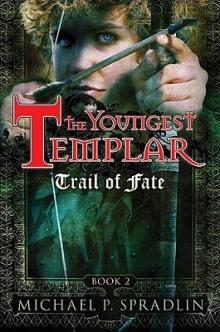 Trail of Fate
Trail of Fate Alcatraz
Alcatraz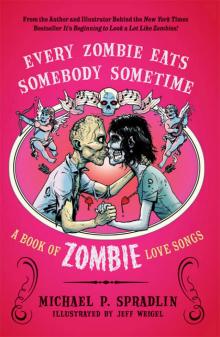 Every Zombie Eats Somebody Sometime
Every Zombie Eats Somebody Sometime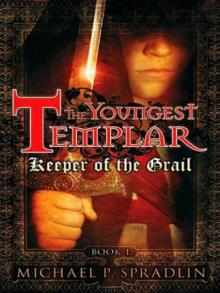 Keeper of the Grail tyt-1
Keeper of the Grail tyt-1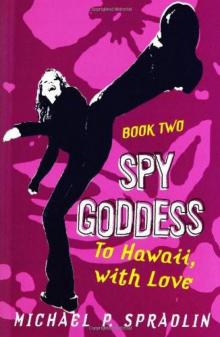 To Hawaii, with Love
To Hawaii, with Love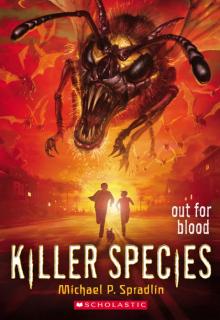 Out for Blood
Out for Blood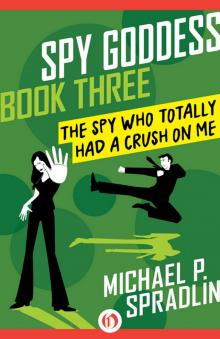 The Spy Who Totally Had a Crush on Me
The Spy Who Totally Had a Crush on Me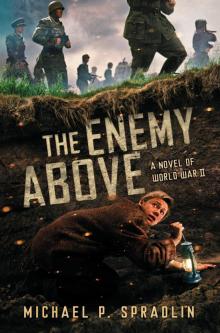 The Enemy Above
The Enemy Above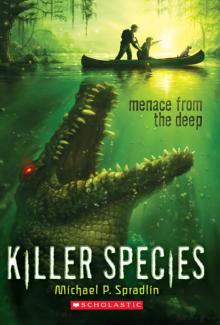 Menace From the Deep
Menace From the Deep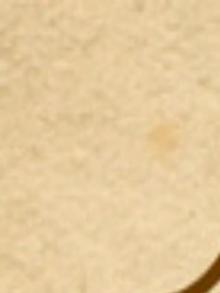 It's Beginning to Look a Lot Like Zombies
It's Beginning to Look a Lot Like Zombies Feeding Frenzy
Feeding Frenzy 3 The Spy Who Totally Had a Crush on Me
3 The Spy Who Totally Had a Crush on Me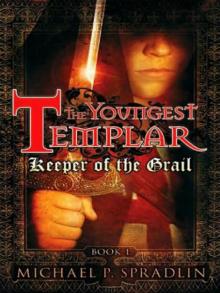 Keeper of the Grail
Keeper of the Grail Prisoner of War
Prisoner of War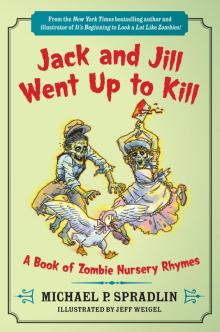 Jack and Jill Went Up to Kill
Jack and Jill Went Up to Kill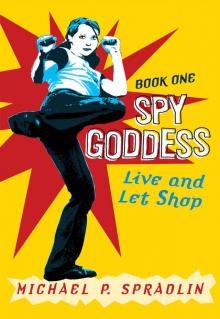 Live and Let Shop
Live and Let Shop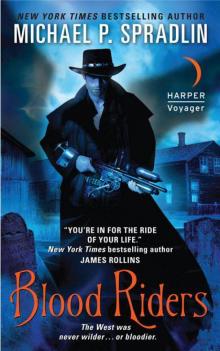 Blood Riders
Blood Riders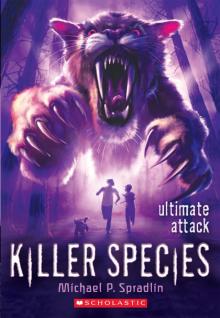 Ultimate Attack
Ultimate Attack